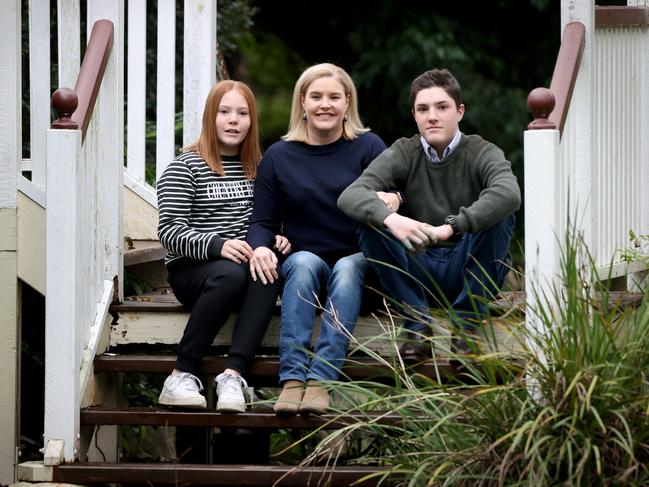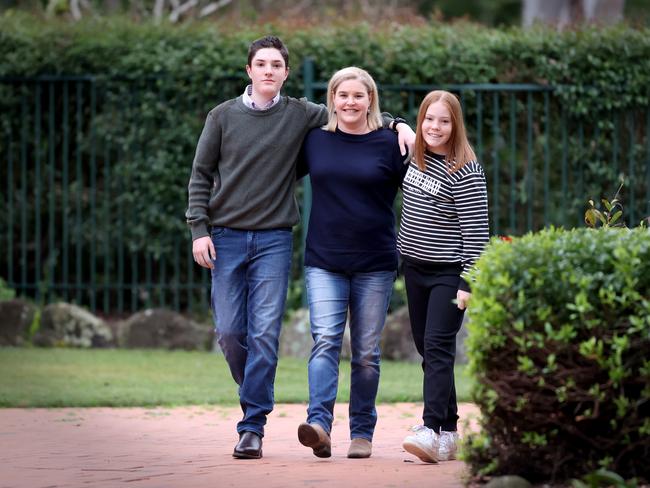Liptember survey reveals ‘mental load’ for women and why they need more support
Brisbane mother Jane Rowan has revealed how she suffered depression and anxiety after the collapse of her first marriage, as more Australian women need help.
QLD News
Don't miss out on the headlines from QLD News. Followed categories will be added to My News.
Exclusive: Brisbane women are more likely to have a severe mental health disorder than women living in other Australian cities, a survey has found.
In the first ever gender-specific national study into women’s mental health commissioned by the charity Liptember Foundation, more than a quarter (27 per cent) of women in Brisbane said they have a severe mental illness, 15 per cent have a moderate disorder, 17 per cent a mild disorder, while just 42 per cent said they are well.
Of those who are mentally unwell, many reported more than one issue.
Seven out of 10 said they are currently suffering from stress, more than half have anxiety, 45 per cent have body image issues, a third have at least one affective mood disorder and a quarter are experiencing psychological distress.

Liptember said the 4000-strong survey showed there was a “gender gap” with less than half of those reporting a mental health problem, seeking treatment for it.
It found that the “mental load” for females was vastly different to men’s, with biological, socio-economic, political and cultural factors associated with being female having a significant impact on mental health.
“There has been a persistent blind spot when it comes to women’s mental health and the lack of research, programs, and support focused on women’s mental health is something we’re committed to improving,” Liptember Foundation CEO and Founder Luke Morris said.
Mum Jane Rowan, 49, of Brisbane, said she suffered depression and anxiety after the collapse of her first marriage.
“I was trying to re-establish my career, working full-time with a child on my own and paying a mortgage,” Ms Rowan, who works in marketing, said.
“I was having panic attacks at work.
“At the time I felt like a total failure and I was only 33.
“There’s pressure for women to be high achieving in all aspects of their lives.”
Ms Rowan said more recently her daughter has suffered from anorexia, blaming it in part on pressure from social media, and said there needed to be more health treatments “specifically designed for women”.
The survey found that across Australia, one in five girls in their teenage years experience eating disorders and suicide or self harm, more than double the normal population.
It also found that half of all women have a mental health problem, with household chores, finances, work, gender inequality, social pressures, hormonal issues and fears over personal safety all contributing.
Seven in 10 Australian women said they currently suffer from stress, 44 per cent have anxiety, while 38 per cent are battling body image issues.
More than a quarter (28 per cent) said they do not have enough time to address their mental health problems.

The survey also found stress was now more prevalent among females under 29 years of age, than in older women, as was previously the case.
While, minority groups are in desperate need of specific support with one in five in the LGBTIQA+ population at risk of suicide and self-harm and almost one in five Indigenous Australian women having substance use disorders.
Professor of Psychology Navjor Bhullar said as a result of gender-related differences, women can experience certain mental health conditions at higher rates than men.
“Biological factors like menstruation, menopause, pregnancy and birth; as well as certain experiences such as miscarriage, ovarian or cervical cancer, polycycstic ovary syndrome and endometriosis can each present unique factors impacting on women’s mental health,” she said.
Meanwhile, the latest Government figures back the results of the survey, finding that females, particularly those under 24, are overwhelmingly more likely to suffer mental illness.
The Australian Bureau of Statistics in its study released this week found that one in four females (24.6 per cent) had a 12-month mental disorder in 2020-21, compared with 18 per cent of males.
That jumped to almost half (46.6 per cent) for females aged 16 to 24.





